Assemblyline Gospel: Japan's Foreign Wedding Pastors
The Quirky Series > Penis Fest > Love Janitor > Maid Cafe > Race Queen > Cosplay > Pastors > Melons > Xmas
Though the unforgiving nature of the news business might lead one to believe otherwise, the Captain does have his sentimental leanings. For example, when his regular bail bondsman mentioned his desperate search for a wife, the Captain did not hesitate in offering up junior reporter Junko's phone number. At his heart, the Captain's a regular softy.
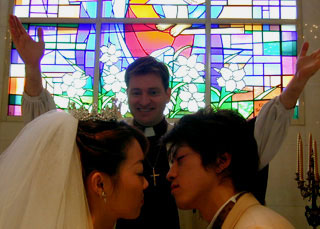 His continual dedication to his work, however, hasn't allowed for him to tie the knot himself. Still, the Captain remains on the lookout for that someone special. (A dowry containing a 12-pack oftentimes will satisfy his definition of "special.") But this week he enters the world of foreign wedding pastors. Attend a ceremony yourself, and then join the Captain at the reception. He'll be first in line at the buffet.
His continual dedication to his work, however, hasn't allowed for him to tie the knot himself. Still, the Captain remains on the lookout for that someone special. (A dowry containing a 12-pack oftentimes will satisfy his definition of "special.") But this week he enters the world of foreign wedding pastors. Attend a ceremony yourself, and then join the Captain at the reception. He'll be first in line at the buffet.
At the time, Aaron Frisell was just starting out as a wedding pastor in Japan, still getting his feet wet. And there he stood, at the head of the church, waiting to begin the ceremony with the pews filled mainly with gentlemen sporting punch-perms, flashy suits, hats, and sunglasses.
Coming from a Christian background and having gone through many years of Bible training in the United States, Aaron knew that there are certain acts which are simply not acceptable in God's house. Wearing sunglasses and a hat are indeed two of them, and this applies to yakuza members the same as everyone else.
So a standoff ensued. Aaron announced that he wouldn't begin until everyone was appropriately attired. After a few awkward minutes, one gentleman in the front stood, removed his offending items, and the rest of the audience slowly followed.
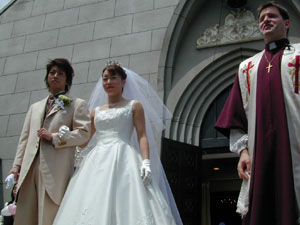 "That was stupid [of me]," recalls Aaron, 35, who estimates that he has presided over nearly 20,000 weddings in chapels, churches, and wedding halls in the past nine years. "That was naive as a young pastor. The Japanese don't know - it's not their culture. I don't need a showdown of authority. Now I'm more mature - I just let it go."
"That was stupid [of me]," recalls Aaron, 35, who estimates that he has presided over nearly 20,000 weddings in chapels, churches, and wedding halls in the past nine years. "That was naive as a young pastor. The Japanese don't know - it's not their culture. I don't need a showdown of authority. Now I'm more mature - I just let it go."
Adapting to cultural differences is indeed a key to success in the foreign wedding pastor business in Japan. And what a business it is. Though Christians represent only 1% of the population, Christian-style weddings have increased in recent years to comprise over 60% of all nuptials. Be it for reasons of mere fashion or an increasing desire on the part of women to rise above their diminished standing in traditional Shinto ceremonies, this translates into a huge demand for foreign rent-a-pastors and all the various people and props needed to give visual credibility to these 20-minute ceremonies which could be seen as the world's greatest gospel show on earth.
Prior religious training for the role of wedding pastor is usually nil. Prospective pastors with reasonable Japanese skills can be trying on their robe inside of two weeks after studying a ceremony script and observing a few real weddings. Though the language of the ceremonies is usually Japanese, the scripts are in romanji (roman letters) to allow for easier pronunciation. And seeing as this is Japan - a place where uniformity is preferred above all else - the scripts are always nearly identical; from the opening salvos to the singing of "What a Friend We Have in Jesus."
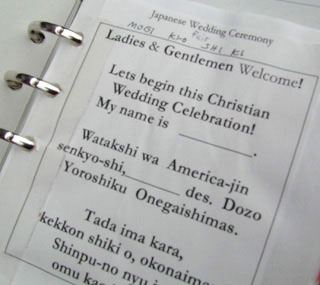 Generally, the pastors are white foreigners, maybe English teachers or bartenders, who are looking to pad their income on weekends. Atheists are recruited as eagerly as evangelists. In Japan, it is entirely appearance that counts.
Generally, the pastors are white foreigners, maybe English teachers or bartenders, who are looking to pad their income on weekends. Atheists are recruited as eagerly as evangelists. In Japan, it is entirely appearance that counts.
"Christianity is a foreign religion [in Japan]," says Todd Thicksten, a 36-year old missionary from California who performs ceremonies at the Cerulean Tower Tokyu Hotel in Tokyo's Shibuya Ward. "[To the Japanese] if you want it done right, you have to have a foreigner do it. It is an image thing. It is similar to thinking: if you want your pipes fixed, you get a plumber and not a trash collector."
The look of choice that is preferred is perhaps a Sean Connery-type; one who possesses grace and dignity without being bombastic. A talent for delivering ample eye contact in a slow, even manner is a plus as well.
Increased competition in the last 5 years has dropped the standard wedding pastor pay rate from roughly 18,000 yen per ceremony to less than 15,000 yen. (Rumors abound of pastors garnering upwards of 30,000 yen even today in isolated areas or under special arrangements.) Still, this can amount to a tidy sum given that wedding pastors are known to perform roughly three to six back-to-back weddings a day with a short break in between each.
Though it is not uncommon to hear of makeshift wedding halls or chapels being carved out of three adjoining hotel rooms, most locations for the ceremonies go to great pains to recreate the palatial atmosphere of the best Europe has to offer.
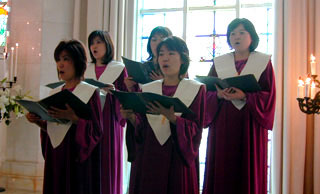 The Maria Chapel, where Aaron performs the majority of his ceremonies, in Kashiwa, Chiba Prefecture has pulled out all the stops. The chapel's pipe organ is from Germany, the stained glass is from France, and the hired gospel singers are from some of Tokyo's top schools. Victorian furniture fills the lounge with stone cherubs frolicking in the numerous fountains scattered in between the sculpted greenery fanning out through the compound.
The Maria Chapel, where Aaron performs the majority of his ceremonies, in Kashiwa, Chiba Prefecture has pulled out all the stops. The chapel's pipe organ is from Germany, the stained glass is from France, and the hired gospel singers are from some of Tokyo's top schools. Victorian furniture fills the lounge with stone cherubs frolicking in the numerous fountains scattered in between the sculpted greenery fanning out through the compound.
Aaron and Todd are both relative anomalies in the business given that their motivations are not monetary; rather, they are here to spread the gospel of Jesus Christ. They are both employed by the Christian Bridal Mission, a company of 1,000 pastors (40% of whom are foreigners) with offices throughout Japan that began operating about 25 years ago. Unlike nearly all of the other estimated 40 companies in Tokyo that employ foreigners without an accredited religious education to simply run through the ceremonies, the Christian Bridal Mission recruits real missionaries and ordained pastors.
The rapid-fire style of the weddings and the fact that the audience is composed almost entirely of non-Christians makes for a perfect combination to spread such a message.
"I have a captive audience," Aaron says of his lack of need to pound the pavement in a traditional missionary sense. "In 20 minutes, I can make Christianity approachable. You get the whole gospel message out - it's the best. That's the goal."
But critics have condemned the practice in Japan because the majority of the wedding pastors are not degreed priests or missionaries. Calls of blasphemy are misdirected, says Reverend Kenny Joseph, the founder of the Japan Association of Preachers and Ministers (JAPAM).
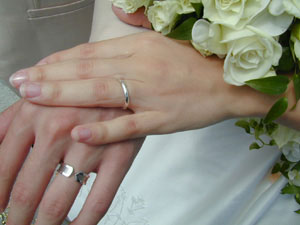 "They are pinch hitters," he says of the void in Japan for wedding pastors that these foreigners fill. To him, the biggest problem lies with foreigners who work as wedding pastors without a proper working visa and fake pastor credentials obtained overseas. His group is attempting to "clean the stable floor" of such unqualified wedding pastors by offering a 10-step certification program that gives wedding companies peace of mind in the knowledge that JAPAM certificate-bearing wedding pastors are not imposters. The current rate of passage for the program is only 40%.
"They are pinch hitters," he says of the void in Japan for wedding pastors that these foreigners fill. To him, the biggest problem lies with foreigners who work as wedding pastors without a proper working visa and fake pastor credentials obtained overseas. His group is attempting to "clean the stable floor" of such unqualified wedding pastors by offering a 10-step certification program that gives wedding companies peace of mind in the knowledge that JAPAM certificate-bearing wedding pastors are not imposters. The current rate of passage for the program is only 40%.
"It is not a real church," emphasizes Aaron, who says that the official wedding takes place with the signing of the marriage documents at the local city hall. "It is an assemblyline of people waiting to hear the gospel of Jesus Christ. They sit down, they are quiet, they listen to gospel messages - and that's it."
This assemblyline nature of the proceedings and the unique position occupied by the pastors has necessitated a few rules of wedding pastor etiquette: don't leave the clip-on microphone turned on when using the bathroom between ceremonies; don't speak Japanese too well (the Japanese prefer a foreigner who struggles a bit); don't bow too low (maintaining a degree of authority is important); and be sure to get the couple's names right.
"Basically, if you get the names wrong, that's big time - the biggest mistake a pastor can make," warns Todd. Should this happen, a complaint will be filed, and the wedding pastor's company will have to pay for the wedding and offer numerous apologies and gifts.
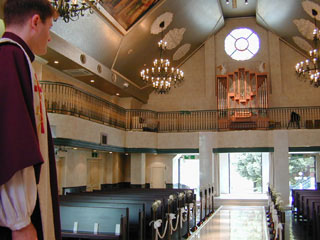 Awkward moments are never in short supply, as any veteran wedding pastor will explain. The lack of understanding of church protocol on the part of the Japanese audience and fact that pastors can get nervous will often result in some interesting situations.
Awkward moments are never in short supply, as any veteran wedding pastor will explain. The lack of understanding of church protocol on the part of the Japanese audience and fact that pastors can get nervous will often result in some interesting situations.
Todd explains: "Pastors have fainted. They [the audience] think it is part of the show. They sit and wait for him to come to and finish the ceremony. Pastors have vomited in the plants. They think it is part of the blessing ceremony. Wedding pastors are humans. Things happen."
The origin of the boom is often traced to the Christian-style ceremony in 1980 for Japan's pop princess of the '70s, Momoe Yamaguchi. Then, after Princess Diana's lavish affair in 1981, phones in Tokyo area hotels were ringing off the hook with requests for fashionable Christian-style extravaganzas.
Reverend Joseph, though, sees this bonanza as being more than a Japanese woman's wont to wear a white dress. It is instead a rejection of her place in the Shinto ceremony.
"She is like a head of cattle," he says of the bride's role in a traditional Shinto ceremony where she maintains a subservient position to her husband at all times. "She's no moron. This [the popularity of Christian weddings] is not a passing fad."
Yet isn't it a bit sad in that the intended Christian meaning is absent from an event of such great importance?
"This is her day. It is celebration day and not indentured servant day," says Aaron, the latter reference being to the average woman's eventual place in male-dominated Japan. "It is an all-day event where she is the center."
Amen.
The Quirky Series > Penis Fest > Love Janitor > Maid Cafe > Race Queen > Cosplay > Pastors > Melons > Xmas

